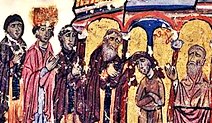Unfaithful
 In 326, Constantine the Great had his eldest son Crispus -and Caesar- seized and put to death by "cold poison". A month later, he had his wife, the Empress Fausta, killed. Fausta was left to die in an over-heated bath. Their names were wiped from the face of many inscriptions, references to their lives in the literary record were erased, and the memory of both was condemned.
In 326, Constantine the Great had his eldest son Crispus -and Caesar- seized and put to death by "cold poison". A month later, he had his wife, the Empress Fausta, killed. Fausta was left to die in an over-heated bath. Their names were wiped from the face of many inscriptions, references to their lives in the literary record were erased, and the memory of both was condemned.
Few ancient sources are willing to discuss possible motives for the events but it seems that the Empress was either in an illicit relationship with Crispus, or she was spreading rumors about such a relationship.
It’s complicated
Valentine I (363-375) may have been polygamous. According to a source, when empress Marina Severa saw her friend Justina at the baths, she was greatly struck with the beauty of the virgin, and spoke of her to the emperor, saying that she was so lovely, that she herself, though a woman, was altogether charmed with her.
The emperor was interested. He tried to find a way to marry Justina, without repudiating Severa. He accordingly framed a law by which any man was permitted to have two lawful wives. The law was promulgated and he married Justina, by whom he had Valentinian the younger.
This story is reported only by Socrates Scholasticus. There is no trace of any edict allowing polygamy in the laws passed by Valentinian I or by any other emperor.
The Secret Story
The historian Procopius wrote a rather unflattering account of the reign of Justinian titled the "Secret History". The manuscript was lost for centuries until it was found in the Vatican library. It was published in 1623, over a thousand years after the deaths of Justinian and Procopius.
It is remarkable, among other things, for the almost pornographic description of Empress Theodora's young days as a performing dancer.
Of Humble Origins
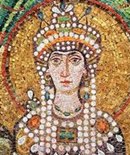
Justin I, was a swineherd in his youth but made a successful career in the city guard. He had married a palace slave named Luppicina who later took the more civilized -and Greek- name "Euphemia". The ex-slave became an empress after the coronation of Justin.
Despite her background, she was strongly opposed to the marriage of Justin's nephew Justinian who wanted to marry Theodora, an actress.
Imperial proposal
 Irene of Athens (797-802) ruled at a time of magnificent contemporaries, especially Harun al-Rashid (who ruled the Abbasid caliphate at its peak) and Charlemagne.
Irene of Athens (797-802) ruled at a time of magnificent contemporaries, especially Harun al-Rashid (who ruled the Abbasid caliphate at its peak) and Charlemagne.
Apparently, Charlemagne wanted to marry Irene (thus reuniting the Empires), but she would not rule from such a barbaric venue as Aachen.
She didn't say "no" however. Maybe she was thinking about it but, then, things changed.
Poisonous
Empress Theophano, the daughter of an Inn keeper from Sparta, had the unusual record to be the woman of 3 different emperors. (her grand-daughter, empress Zoe, had a better score but she was a quite different case).
Theophano was chosen by Romanos II (959-963). After his sudden death, she married Nikephoros Phocas, who was elected emperor. Theophano conspired against him with her lover John Tzimiskes and organized the assassination of Phocas. She was planning to marry Tzimiskes but when he became emperor, he was forced by the patriarch to confine her in a convent.
She was suspect for poisoning Romanos II (although the motive for such an action is not clear); also, that she might have poisoned her father-in-law, emperor Constantine Porfyrogenetos.
Considering that her two sons, Basil (the Bulgaroktonos) and Constantine, became full-time emperors, Theophano had a central role in the lives or deaths of no less than 6 Byzantine emperors. Furthermore, she was the mother-in-law of two great foreign kings, since one of her daughters married Otto II of Germany and the other the czar Vladimir I of Russia.
Not bad for a woman of humble Spartan origin.
Fatherhood
Around 867 when Basil I was just a bodyguard of Michael III, he divorced his wife Maria, on Michael's orders, and married Eudokia Ingerina, Michael's favorite mistress. It was commonly believed that Leo VI, Basil's successor and son, was actually the son of Michael III. The subsequent promotion of Basil to Caesar and then co-emperor provided the child with a legitimate and imperial parent and secured his succession to the throne. Basil seems to have shared the belief that Leo was not his son and hated him. Also, Leo himself seems that he believed that Michael III was his real father.
This means that the emperors of the magnificent Macedonian dynasty were actually the descendants of Michael the Drunkard.
"Moechian Controversy"
Leo VI the Wise (886-912) caused a major scandal with his numerous marriages. His first wife Theophano, whom his father Basil I had forced him to marry and whom Leo hated, died in 897. He then married Zoe Zaoutzaina who died as well in 899. 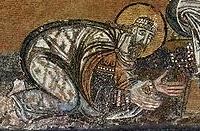
After Zoe's death a third marriage was normally illegal, but he married again, only to have his third wife Eudocia Baïana die in 901. Instead of marrying a fourth time, which would have been an even greater sin, Leo took as mistress Zoe Karbonopsina. He married her only after she had given birth to a son in 905 (Porfyrogenetos), but incurred the opposition of the patriarch Nicholas Mystikos.
Leo replaced him with a more flexible patriarch, and got his marriage recognized by the church (albeit with a long penance attached, and with an assurance that all future fourth marriages would be outlawed) but opened up a religious conflict (the so-called "Moechian Controversy" from the Greek moichos, "adulterer") and allowed new grounds for papal intervention into Byzantine affairs.
Beauty Contest
Emperor Theophilos (820-829) was unmarried when he ascended to the throne, and he organized a "Bride Show" to find the right person. His stepmother, Euphrosyne, invited the most beautiful and accomplished virgins at Constantinople to a fête in her private apartments. Theophilos entered the rooms, and walked forward with a golden apple in his hand.
He was struck by the grace and beauty of Eikasia (or Kassia), with whose features and talents he must have been already familiar, and he stopped to address her. The proud beauty felt herself already an empress; but Theophilos commenced his conversation with a rude remark, “Woman is the source of worst things”, to which the young lady too promptly replied, “But woman is also the source of the best things (as a mother).
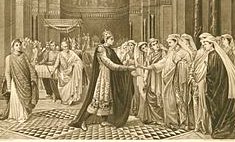
Her attitude annoyed the emperor, and he walked on. His eye then fell on another beauty, Theodora, and gave the apple to her without risking another question.
Eikasia retired into a monastery which she founded. She composed hymns, still in use in the Greek church. She became known as Kassiani and she is a saint of the Orthodox church. A popular legend implies that she and Theophilos became lovers but this probably is not true.
Fake bride
After his defeat at the Battle of the Gates of Trajan (986) by the Bulgarians, Basil II attempted to make up his losses by turning king Samuel's brother, Aaron, against him. Aaron was tempted with Basil's offer of his own sister Anna in marriage (the same Anna wed to Vladimir I of Kiev, two years later).
The negotiations failed when Aaron discovered that the bride he was sent was a fake. The woman that the Byzantines sent was not the sister of their emperor!
Diplomatic marriage
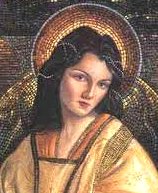 Anna was the daughter of Romanos II and sister of Basil II (976-1025). The king of the Kiev Rus Vladimir I who earlier had converted to Christianity with his people (in 988), made a deal with Basil for the marriage, in exchange for his support against the rebels Bardas Sclerus and Bardas Phocas. Vladimir, as a pagan, had already 5 wives.
Anna was the daughter of Romanos II and sister of Basil II (976-1025). The king of the Kiev Rus Vladimir I who earlier had converted to Christianity with his people (in 988), made a deal with Basil for the marriage, in exchange for his support against the rebels Bardas Sclerus and Bardas Phocas. Vladimir, as a pagan, had already 5 wives.
So Anna became the first Byzantine princess to marry -for political reasons- a "barbarian" foreign ruler. From a macro-historic perspective, it worked out fine.
Royal match making
Zoe succeeded her father, Constantine III, and became empress when she was 50. Earlier, she had lost a couple of opportunities to become empress of the Holy Roman Empire. Here is what happened:
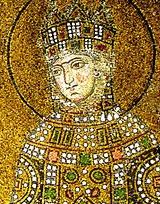
In 1001 Otto III sent an embassy, headed by Arnulf, Archbishop of Milan, with the task to select a bride for Otto among Constantine III’s daughters. The eldest, Eudocia, was disfigured by smallpox, while the youngest, Theodora, was a very plain girl. So Arnulf selected the attractive 23-year-old Zoe. She accompanied Arnulf back to Italy, only to discover, when the ship reached Bari, that Otto III had died. So, she had to return home.
Another opportunity arose in 1028, when an embassy from the Western Empire arrived in Constantinople with a new proposal. Constantine VIII and the fifty-year-old Zoe rejected the idea when it was revealed that the groom Henry, the son of Conrad II, was only 10 years old.
Widow for less than a day
Empress Zoe and Michel IV were lovers while emperor Romanos III Argyros, Zoe’s first husband, was still alive. Zoe flaunted Michael openly, and spoke about making him emperor.
Eventually Romanos III was found dead in his bath. Rumors began circulating that Zoe and Michael had used a slow poison to kill him. However, becoming impatient with the poison, Michael had had him strangled or drowned. Adding weight to the rumors was the speed with which Zoe and Michael were married, on the very day that Romanos III died (still unburied).
Tolerance
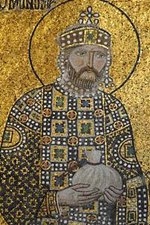 Constantine IX Monomachos (1042-1055), third husband of Zoe, had brought his mistress Maria Sklerena in the Palace with him. He gave to her the title Sevasti and she was participating in royal events as a court high official. Constantine IX Monomachos (1042-1055), third husband of Zoe, had brought his mistress Maria Sklerena in the Palace with him. He gave to her the title Sevasti and she was participating in royal events as a court high official.
Oddly, Zoe tolerated this situation. But the people of the capital were concerned and feared that the lives of Zoe and her sister Theodora were threatened. For this reason, in 1044, the populace tried to attack Constantine who was attending a religious ceremony in the streets of Constantinople. The uprising ended when Zoe and Theodora appeared at a balcony and reassured the people that they were OK.
|

